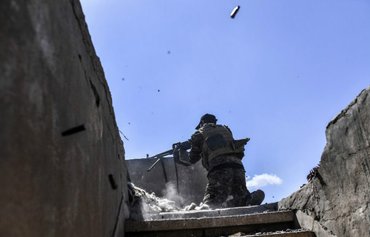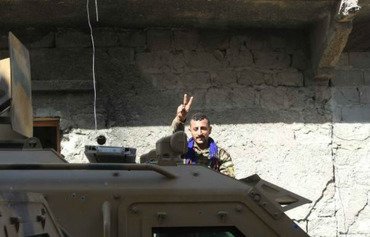Since the Syrian Democratic Forces (SDF) seized full control of al-Raqa, questions have surfaced about the seeming disappearance of foreign emirs and fighters of the "Islamic State of Iraq and Syria" (ISIS).
These elements were conspicuously absent from photographs taken at the surrender, which was brokered by tribal leaders and al-Raqa Civil Council.
Officials involved in the matter told Diyaruna those who remain are rank-and-file elements abandoned by their emirs and foreign fighters, who fled to other areas.
"Current estimates indicate that 275 ISIS fighters who were in the city of al-Raqa have surrendered," SDF media official Mustafa Bali told Diyaruna.
![Members of the Syrian Democratic Forces celebrate victory in al-Raqa at al-Naim roundabout in the city centre. [Photo courtesy of Syrian Democratic Forces]](/cnmi_di/images/2017/10/19/10069-SDF-naim-roundabout-600_384.jpg)
Members of the Syrian Democratic Forces celebrate victory in al-Raqa at al-Naim roundabout in the city centre. [Photo courtesy of Syrian Democratic Forces]
![Syrian Democratic Forces fighters pose for a photograph after seizing full control of the Syrian city of al-Raqa. [Photo courtesy of Syrian Democratic Forces]](/cnmi_di/images/2017/10/19/10070-SDF-raqa-liberation-600_384.jpg)
Syrian Democratic Forces fighters pose for a photograph after seizing full control of the Syrian city of al-Raqa. [Photo courtesy of Syrian Democratic Forces]
Al-Raqa tribes and the city's civil council received the families of those elements upon their surrender.
The ISIS elements who surrendered were transferred to a special camp overseen by the SDF in al-Tabqa, where they will be questioned, Bali said.
Those who are proven to have been involved in criminal activity will be brought to trial, while the rest will be handed over to a committee comprised of the members of al-Raqa tribes.
This committee will serve as their guarantors, Bali said, assuring their place of residence and that they will not get involved in dubious activities.
"If found", foreign fighters who have not surrendered will be dealt with by coalition forces, he added.
A pattern of betrayal
Based on his participation in Operation Wrath of the Euphrates, SDF officer Farhad Khoja told Diyaruna that first-line emirs, especially foreigners, typically slip away from cities in flashpoint areas that are about to fall from their hands.
They head for safer areas, he said, leaving behind rank-and-file elements, "those who were forcibly conscripted and those who took up arms merely for the monthly salary they could collect from the group".
This was the case in al-Raqa, where the only fighters on the scene at the time of surrender were the rank-and-file elements, most of whom were natives of al-Raqa province and its vicinity, he said.
Khoja said he suspects the foreign emirs and the core fighting force slipped out of the city at an earlier time for Deir Ezzor, heading especially for the Albu Kamal area, which is still under the group’s control.
According to some sources, some of them moved to the city of al-Mayadeen and from there to Albu Kamal and its surrounding towns and villages.
"The departure of these fighters does not signal a dereliction of duty on the part of the forces besieging al-Raqa," he said, because the city was surrounded in stages and not all at once, due to its topography and other factors.
"It is clear that the ISIS elements who fled to other areas did so at the beginning of the siege," he added.
Al-Raqa resident Jamal al-Bakkar told Diyaruna that over the last few months, he did not encounter ISIS emirs or foreign fighters when he left the house during lulls in the fighting to get food for his family, as he had done in the past.
All the ISIS elements he saw were locals, he said, most of whom were known.
"This puzzled the civilian population, as the group’s propaganda had heavily touted the notion that the al-Raqa battle was pivotal, and that all its elements would defend the city," he said.
In the end, however, they ran and left the rank-and-file elements to face their fate, he said, which boiled down to fighting to the death or surrendering.
An undeniable exodus
Over the past few months, dozens and perhaps hundreds of ISIS fighters have fled the city of al-Raqa and its hinterland to Albu Kamal, media activist and Albu Kamal native Fajr al-Abdullah told Diyaruna.
Most were foreign fighters, he said, including many Iraqi elements.
"In the beginning, this exodus was conducted covertly, until the presence of these fighters and their families began to become conspicuous in the city streets and markets" of Albu Kamal, he said.
The relocation of ISIS elements from many areas, including al-Raqa, was accompanied by heightened activity from the group's patrols, he said.
Pedestrians and shoppers in the streets and markets in these areas were liable to have their identification papers checked by a patrol at any time, he said, and their phones inspected for photos or internet use.
Local merchants and residents in these areas have observed ISIS newcomers walking the streets in civilian clothes, he added, especially in the markets and when accompanying their families.
Meanwhile, the threat of foreign fighters returning to their countries of origin is set to dominate a G7 meeting of interior ministers that kicked off Thursday (October 19th) in Italy, AFP reported.
Most of the tens of thousands of foreign fighters who travelled to fight in the ranks of ISIS in Syria are believed to have fled over the past few months.
While border crossings have since tightened, making it more difficult for fighters to return, security experts have warned of renewed possibilities of strikes as the pressure on ISIS intensifies.

![Many local elements of the 'Islamic State of Iraq and Syria' surrendered to the Syrian Democratic Forces. Foreign fighters and top-tier commanders were conspicuously absent from the group. [Photo courtesy of the Syrian Democratic Forces]](/cnmi_di/images/2017/10/19/10068-ISIS-fighters-surrender-600_384.jpg)





